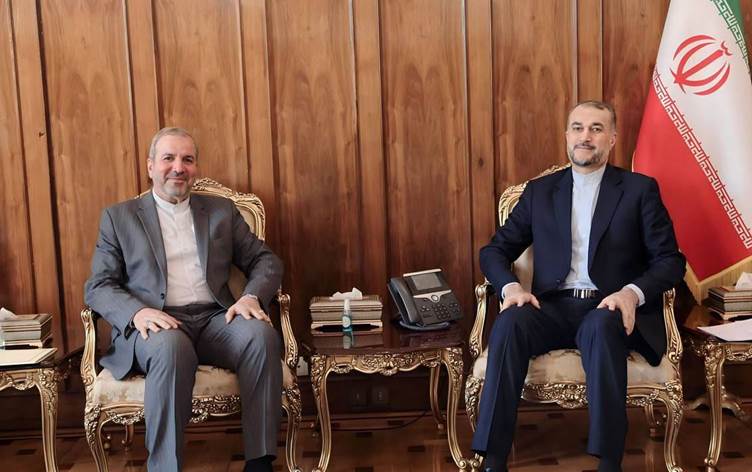Alwaght- Iran’s Foreign Minister Hussein Amir-Abdollahian met with the country’s top diplomat to Iraq, stressing the need for the “full implementation” of the agreements between Tehran and Baghdad.
Amir-Abdollahian received Iran’s ambassador to Iraq Mohammad Kazem Al-e Sadeq in Tehran, discussing the progress of cooperation and bilateral between the two neighboring countries.
“There is the need of the full implementation of the agreements and documents signed between the high officials of the two countries in order to further enhance the bilateral cooperation,” Amir-Abdollahian said.
Iran and Iraq have shared a strong relationship since the fall of Saddam Hussein in 2003. The two countries have engaged in law large-scale trade ties ever since.
The two countries signed a security deal last year to clear anti-Iranian militia groups active on the Iraqi border with Iran. Baghdad said it was committed to security of Iran.
These groups, mostly labeled terror groups by Tehran, carried out several attacks on the Iranian security forces, especially in 2023 Western-backed riots that swept the country.
Iraqi Foreign Minister Fuad Hussein in September last year reassured Iran that his country remains committed to its security agreement with the Islamic Republic regarding the expulsion of anti-Iran terrorist groups from the semi-autonomous Kurdistan region.
“We have taken the necessary measures to purge armed groups from areas along the border between Iraq and Iran. And for that purpose, I will travel to Tehran tomorrow to hold talks on the matter with Iranian authorities,” the top Iraqi diplomat announced.
He added, “Our constitution does not allow the Iraqi soil to be used as a launching pad for attacks on neighboring countries. At the same time, we do not accept the national sovereignty of Iraq to be undermined.”
Also in September, Iran's FM told visiting Bafel Talabani, leader of the Patriotic Union of Kurdistan (PUK), in Tehran that the presence of terrorists in Iraqi Kurdistan region contravenes the Arab country's constitution and is not compatible with cordial relations between Tehran and Baghdad.
The president of Iraq's Kurdistan, Nechirvan Barzani in the same month during a meeting with Iranian ambassador to Iraq said that Erbil was committed to the security of Iran.
He stressed the importance of relations with Iran as an important neighbor for Iraq's Kurdistan region.
However, Iran warned Kurdistan is not yet committed to the agreement as it allows armed terrorists to roam free in its territory and pose threats to Iran on the strength of Israeli support.
On January 15, Iran's IRGC launched an attack on a secret site of Mossad in Erbil, killing a Kurdish businessman, Peshraw Dizayee, with links to the Israeli spying organization and funding and organizing attacks on Iran.
Dizayee reportedly amassed a fortune through the illicit export of Iraqi oil to the Tel Aviv regime, an archenemy of Tehran.
Dizayee worked closely with Elan Nissim who was the notorious team leader of Tasa Elite, a Mossad-affiliated spying firm responsible for training terrorist groups and recruiting agents in the West Asian region, and Hussein Yazdanpanah, Secretary General of the Kurdistan Freedom Party which is a notorious terrorist group based in northern Iraq. Dizayee played a pivotal role in organizing anti-Iran operations and reportedly received substantial rewards for his contributions.
Iran more than once warned Erbil needs to eradicate terrorists in Kurdistan autonomous region or face the consequences.



























